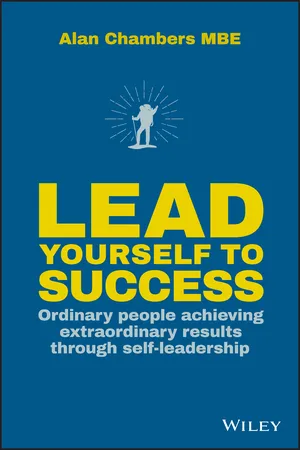
Lead Yourself to Success
Ordinary People Achieving Extraordinary Results Through Self-leadership
- English
- ePUB (mobile friendly)
- Available on iOS & Android
Lead Yourself to Success
Ordinary People Achieving Extraordinary Results Through Self-leadership
About this book
Lead Yourself to Success is your personal guidebook to greatness. Alan Chambers has led many expeditions to the North and South poles but you don't have to lead a national team or a multinational corporation to be successful, as long as you can lead yourself. The desire to learn is human nature, and lessons from those who have been where you want to go are extraordinary opportunities. You gain the insight and guidance you need to get there, and learn how to lead your own expedition down the path to success.
Like any adventure, good preparation is key. You don't take off for the North pole on a whim, and you don't just leap into leadership without understanding the responsibilities it entails. This book shows you how to develop the leadership mindset to get wherever you want to go in life, trust your own judgement and come out on top of the world.
- Uncover your inner leadership potential
- Learn how others succeed
- Find the adventure in everyday life
- Lead yourself on an expedition to greatness
Alan helps thousands of people every year unlock the door to higher performance. Every single one of those people was a leader waiting to happen, even if they didn't know it – but once they truly realised where their potential could take them, they became unstoppable. Let yourself become unstoppable with Lead Yourself to Success.
Frequently asked questions
- Essential is ideal for learners and professionals who enjoy exploring a wide range of subjects. Access the Essential Library with 800,000+ trusted titles and best-sellers across business, personal growth, and the humanities. Includes unlimited reading time and Standard Read Aloud voice.
- Complete: Perfect for advanced learners and researchers needing full, unrestricted access. Unlock 1.4M+ books across hundreds of subjects, including academic and specialized titles. The Complete Plan also includes advanced features like Premium Read Aloud and Research Assistant.
Please note we cannot support devices running on iOS 13 and Android 7 or earlier. Learn more about using the app.
Information
1
Researching the Vision
- OPERA. Ordinary People Extraordinary Results Achieved.
- Successful failures. Why it is important to try first and, if you do fail, to learn from it, bounce back, and move forwards.
- How to learn from failures the Royal Marines way.
- ‘Train hard, fight easy’. Training evolutions explained.
- The ‘Concept, Detail, Results, and Recommendations’ model.
- Dynamic Planning Mission Debriefs to pass on the knowledge.

Explain
Victory awaits him, who has everything in order – luck we call it.Defeat is definitely due for him, who has neglected to take the necessary precautions – bad luck.Roald Amundsen
Alan's TP2K Diary (i.e. the March 2000 Unsupported Expedition to the North Pole)
OPERA: Ordinary People Extraordinary Results Achieved
The Importance of ‘Successful Failures’
Friendship and Teamwork are Not Always the Same Thing
Alan's 1998 North Pole Diary
Table of contents
- Cover
- Table of Contents
- Foreword
- Acknowledgements
- Introduction
- 1 Researching the Vision
- 2 Blending the Team
- 3 Communication Under Duress
- 4 Rethink the Old Ways
- 5 Build Confidence Early
- 6 Tent Time
- 7 Self‐leadership and Self‐questioning
- 8 Leading from the Back
- 9 Train the Mind and the Body Will Follow
- 10 Celebrate Small Victories
- 11 Dynamic Planning
- 12 New Problems, New Measurements
- 13 Trust – the Final Frontier
- 14 Extreme Learnings
- Index
- End User License Agreement